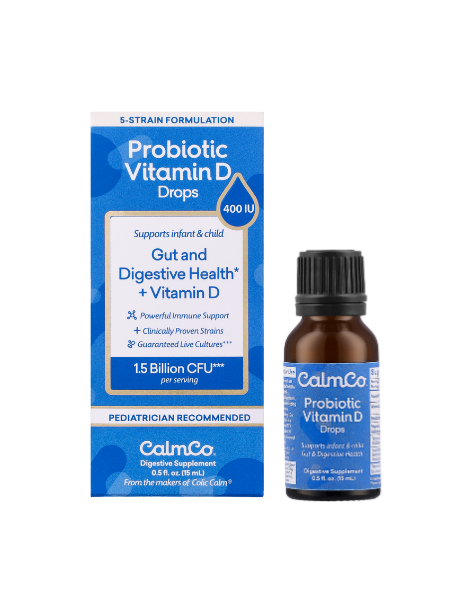Probiotics
Why Probiotics?
Probiotics, or “good” bacteria, aid in the health of your baby’s microbiome or gut flora. By administering a daily probiotic, you can help rebalance your baby’s delicate digestive system. Research has shown probiotics improve vitamin absorption, digestion and development of a healthy immune system.
While probiotics are found in food, the fastest and most effective way to treat your baby’s system is to give them a probiotic supplement. It’s important to know that when choosing the probiotic that’s best for your little one that the strains in the supplement are important.
Research has proven that different probiotic strains treat different symptoms. CalmCo Probiotic has 5-key strains that are specific to helping with colic and intestinal issues:

P.pentosaceus has been shown to support healthier microflora balance, which correlates to decreased crying time in colicky babies. It also supports a calm gut.
B.longum, in combination with the other four strains of CalmCo Probiotic, has been shown to improve immune health in infants and children.
L.planatrum enhances the production of beneficial bacterial strains in the gut which promotes a healthy GI tract.
L.brevis is a probiotic bacterium that has been shown to boost oral hygiene and restore the balance oral microflora.
P.acidilactici has been shown to support a variety of digestive health outcomes and promotes a healthy gut balance.
Babies younger than 12 months old need 400 IU of vitamin D each day. Vitamin D is essential for babies to absorb calcium and phosphorus which help to build strong bones and prevent against rickets.
Common confusion with Probiotics relates to the CFU or “colony forming units” count. The CFU quantifies how many bacteria are living and active. Colic Calm Probiotic is specially formulated to delivers 1.5 BILLION CFU** per serving. So your little one is getting the highest quality daily digestive maintenance.

Causes of Gas
All babies have gas; some babies simply have more than others. Furthermore, some babies have an easier time passing gas, which may stem from a learned or innate ability. While a certain amount of gassiness is completely normal, it may be causing your baby discomfort, if you notice tell-tale symptoms, such as abdominal bloating, hard distended belly, frequent burping, spit-ups, hiccups, flatulence and excessive fussiness or restlessness.
LEARN MOREPrevention
Recognizing the sensitive and over-stimulated baby is often the most difficult for parents. Keeping outings and visitors to a minimum for a few weeks may decrease the degree of gassiness and fussiness. Allowing the infant to have quiet and uninterrupted sleep helps prevent over-tiredness, increased irritability and unnecessary crying episodes.
If the signs of hyper-lactation seem familiar, then contact a lactation specialist to help correct the problem. Avoiding the foods mentioned above for at least a few days may help indicate how much of a problem they cause baby. If gassiness and fussiness are
excessive around the clock, a two-week trial elimination of dairy, soy and peanuts will show if mother’s diet is a contributing factor.
Burping the baby thoroughly will reduce the amount of air in the stomach, so that it does not pass on to the intestinal tract. Unfortunately, burping is not 100% effective at eliminating gas, since it has absolutely no effect on the gas created in the intestines during normal digestion. There are various physical therapies to relieve gas, such as baby massage, which may prove somewhat effective in helping baby to release gas. Simply applying light pressure on the tummy can soothe and help. You can also

try carrying baby in the “football hold” – face down on your forearm with baby’s legs straddling your elbow and baby’s chin resting in your hand. The gentle pressure placed on the little tummy can help soothe and release baby’s gas.
If this does not work, there are several treatments available for infant gas. As always, you should consult your pediatrician first before giving baby any medications, remedies or supplements.
Approaching the problem of infant gas and fussiness as a multi-level problem is usually most effective. Probiotics can be an excellent choice for treating infant gas symptoms. CalmCo® Probiotic Drops are allergen-free, side-effect-free, and have a special clinically backed 5-strain formulation with guaranteed live cultures.*
Many parents and caretakers have been relieved to find a remedy with 5 strains and no synthetic ingredients, just active cultures and sunflower oil. CalmCo Probiotic Drops can also have a long-term effect at preventing bloating, stomach cramps, and frequency of loose stool. It is also extremely effective on gas created during introduction of new foods into babies’ delicate digestive tracts.
Remember that babies are just getting accustomed to this world. As they grow older, most will become far less gassy and fussy. Their digestive tracts will learn how to function well. In the first three months of life, babies are not well-equipped to calm themselves.

 Canada
Canada South Africa
South Africa UK
UK EU & Int
EU & Int Ireland
Ireland Australia
Australia Brazil
Brazil New Zealand
New Zealand